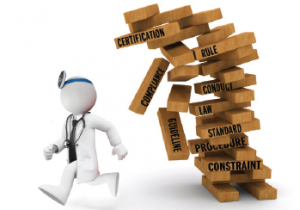
© brovkin; maimu; Texelart/ shutterStock.com
Explore This Issue
April 2017The recent anti-MOC/board certification movement is, in my opinion, based on the realities of medical practice today. The first is doctors having to deal with electronic health records, various reporting requirements, continuous professional development demands (including MOC), and a general sense of loss of control of their practices, particularly for employed physicians, all of which I understand completely. It is not surprising that physicians are reacting to these new pressures that eat away at what is now the most valuable commodity to physicians—time.
The concern I have is that physicians have focused on the certifying boards (in particular, the American Board of Internal Medicine) because of MOC. First, MOC does require a time commitment, and although its goals—encouragement of lifelong learning and quality improvement—are laudable, it is not perfect. However, the vast majority of medical boards have been careful to develop programs that are not onerous and are developing new products that make MOC less time consuming and more meaningful to the individual physician’s practice. The second reason physicians have directed their ire at the certifying boards is that they are the only entities on which physicians feel they can have any impact. Large healthcare corporations, insurers, and the federal government are simply not assailable.
So how does this movement affect self-regulation? One of the ways a profession is defined is that its members possess special knowledge or training not available to other members of society and, consequently, society grants those with that special knowledge the ability to self-regulate its members. The reasons for this are clear: Doctors know much more about the practice of medicine than others, and so should set the standards and measures for the quality of patient care.
I can easily see a family member of a prominent legislator injured or killed in a medical misadventure that will result in the development of a government-led standard-setting and measurement process to fill the void left by the absence of physician self-regulation.
By supporting legislation that will prohibit the use of that last bit of professional self-regulation (the certifying boards), physicians are basically saying that self-regulation should live at the individual physician level (“I got my 25 units of CME, so I don’t need any organization to ensure I practice up-to-date, quality medicine”). In this political era of independence and anti-regulation, this is a true “feel-good” moment for physicians.
The problem is that if these bills become law, physicians will have delegated regulation to legislatures. Basically, physicians are saying that they need legislative help to throw off certification requirements. It will only be a matter of time before legislatures will realize that there has to be some quality measure of medical practice and that since the certifying boards are no longer part of that process, government will have to develop its own standards and measures.
This may seem far-fetched, but I can easily see a family member of a prominent legislator injured or killed in a medical misadventure that will result in the development of a government-led standard-setting and measurement process to fill the void left by the absence of physician self-regulation. And, given our experience with government medical programs, it will be rigid regulations with lots of red tape that will be much worse than board certification and MOC as they currently exist.
It is time for all physicians to work together to ensure we don’t lose our professional self-regulation. The certifying boards are working hard to maintain that concept, and it is much wiser to work with the boards to improve certification and MOC rather than destroy them.
Dr. Miller is the editor of ENTtoday and executive director of the American Board of Otolaryngology.